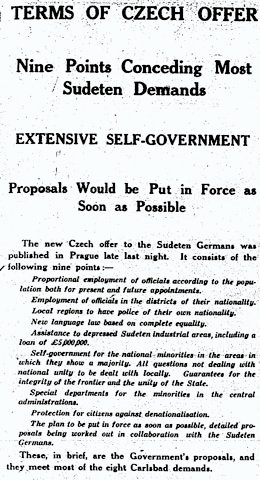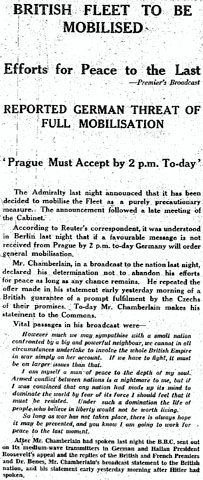
At last, after all the endless reports of meetings to seemingly no end: actual details! As the above -- from the Manchester Guardian (p. 9) -- shows, the Czech autonomy proposals (first reported yesterday) were pretty generous. The Sudetens (and presumably other minorities) would get self-government, language equality, their own civil servants and police. I'm not sure what the 'Protection for citizens against denationalization' means -- more likely something about the right to a passport than maintaining state ownership of industry!
The proposals also include 'Guarantees for the integrity of the frontier and the unity of the State', which seems reasonable enough. But a (later to become infamous) leading article in The Times suggests an alternative (p. 13):
In that case it might be worth while for the Czechoslovak Government to consider whether they should exclude altogether the project, which has found favour in some quarters, of making Czechoslovakia a more homogeneous State by the secession of that fringe of alien populations who are contiguous to the nation with which they are united by race. In any case the wishes of the population concerned would seem to be a decisively important element in any solution that can hope to be regarded as permanent, and the advantages to Czechoslovakia of becoming a homogeneous State might conceivably outweigh the obvious disadvantages of losing the Sudeten German districts of the borderland.
There it is: the first time (at least in my sources) that the idea of the annexation of the Sudetenland by Germany -- the solution eventually adopted at Munich -- was raised in the British press. The Times was often thought, somewhat unfairly, to be especially close to the British government, so a suggestion like this will make people sit up and take notice.
One sign that the nation is starting to become preoccupied with the crisis is the way in which it is starting to appear more frequently in the letter columns. There are no less than four letters about the crisis in today's Manchester Guardian (p. 18). One urges Britain and France to stand firm and support Czechoslovakia, another disdains the idea that Europe should be plunged into war just so France can honour its treaties. A third draws on personal contacts with Germans to argue that they would be unwilling to fight for the Sudetenland, and the last claims that Hitler has no interest in the welfare of the Sudeten Germans, but rather wants to destroy Czechoslovakia's unity, as it stands between him and the Balkans. Overall, the mood is against appeasement, but it's impossible to generalise from these examples to any conclusions about public opinion as a whole, because they are not random selections: only particularly interested people would have taken the trouble to write, and then an editor would have chosen which ones were published. (The Times tried to print a representative sample, but even then that's only of the letters it received, of course.) But it all goes into the mix. Here's another data point, overheard today by George Orwell from an English resident at Gibraltar (where Orwell's ship docked on its way to Morocco):
It’s coming right enough. Hitler’s going to have Czecho-Slovakia all right. If he doesn’t get it now he’ll go on and on till he does. Better let him have it at once. We shall be ready by 1941.
So here appeasement is seen as buying time for British rearmament.
Finally, a couple of backgrounders, which are probably as useful to us today as they were to readers back then! First, a map of the minorities of Czechoslovakia from the Manchester Guardian (p. 13). The black bits are 90-100% Sudeten German.

And secondly, from the Daily Mail (p. 8), a timeline of the evolution of the crisis, from the Anschluss in March up until yesterday:
![]() This work is licensed under a Creative Commons Attribution-NonCommercial-NoDerivatives 4.0 International License.
Permissions beyond the scope of this license may be available at http://airminded.org/copyright/.
This work is licensed under a Creative Commons Attribution-NonCommercial-NoDerivatives 4.0 International License.
Permissions beyond the scope of this license may be available at http://airminded.org/copyright/.






Jonathan Dresner
I've been enjoying this process immensely: the map of ethnicities is particularly striking, given how many modern nations have these kind of ethnicly overlapping borders. And, of course, the whole Ossetian thing...
Leinad
Seconding the Ossetian thing. I also wonder where the above map came from, and by extension what demographics back then were like - I'm guessing this stuff would have been thrashed out pretty heavily back in 1919, but in my condescending present-ist way I can't help be impressed with the attention to detail.
Oh, and good stuff vs The Netherlands the other night Brett - you're looking the goods in behind the strikers with with Kewell.
Pingback:
Airminded · Thursday, 8 September 1938
Brett Holman
Post authorAnd they didn't have our fancy GIS software and ethnicity datasets to make such maps with a few mouse clicks either! 1919 is probably a good guess, though the Czechoslovakian state may have undertaken a comprehensive census more recently than that.
Yes, Ossetia. Kosovo and Bosnia too. The map is striking. One could see how the man on the Clapham omnibus might look at it and wonder how the Sudetens ended up in Czechoslovakia in the first place, and why they shouldn't just be given to Germany right now -- especially if it will prevent a world war.
Leinad
Of course, the bloke on the bus has the luxury of having all his ethno-religious conflicts dead and buried some two-three hundred years earlier (on the big Isle at least). The other problem the Czechs and Slovaks face winning over UK everyman is the amount of wierd consonants in their names. Hard to take a country seriously when it starts with 'Cz', much less go to war over it. President Ben-what?
Got to laugh at the Mail:
'Everybody knows that Czecho-Slovakia was founded in 1919 etc' - I bet they did...
Pingback:
Airminded · Friday, 9 September 1938
Brett Holman
Post authorWell, they weren't quite dead and buried, though. In 1936, the founder of Plaid Cymru, Saunders Lewis, and two other men set fire to a RAF bombing school being built at Penyberth, for which they were imprisoned and (inevitably) became heroes to other Welsh nationalists. And I've seen the Welsh example, even more so than the Irish one, used to help explain the minorities question to befuddled Britons, though how illuminating it was is hard to know ...
Pingback:
Airminded · Saturday, 10 September 1938
Pingback:
Airminded · Monday, 12 September 1938
Pingback:
Airminded · Tuesday, 13 September 1938